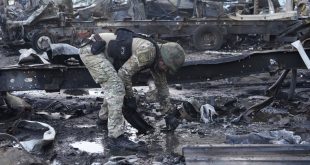From flooding and cyclones to heatwaves and droughts, the stresses and shocks inflicted by rising local weather extremes are extreme. And so they can’t be tackled by one-track options, particularly in resource-poor growing international locations.
As a substitute, gamers within the world improvement house ought to take a extra built-in method when serving to strengthen communities most in danger from local weather shocks, to make sure that the interrelated challenges they face are addressed of their entirety.
For example, in growing international locations, rural poor households are sometimes drawn to city areas seeking higher prospects, however typically find yourself dwelling in slums in a vicious cycle of perpetual poverty.
In addition to placing better pressure on infrastructure, this displacement exposes them to unsanitary circumstances – leaving them extra susceptible to diseases and local weather stresses, and sometimes unable to work or enhance their circumstances in consequence.
So, for resilience-building options to be impactful and work for the entire group, both/or options won’t suffice. Approaches which can be both technical or social is likely to be efficient in strengthening one facet of local weather resilience – corresponding to constructing flood defences, or enhancing entry to potable water – however no more complicated, interrelated points.
It is just by integrating each social and technical approaches to resilience-building that extra complete, sustainable options will be constructed.
Creating a hybrid mannequin is one technique to obtain this, which is exactly what India-based Mahila Housing Belief has achieved with its mission to empower women in poor communities throughout South Asia to construct resilience in opposition to growing local weather pressures.
Based as an autonomous non-profit in 1994, Mahila Housing Belief has developed into an agile social enterprise – aided in recent times by mentoring and help from the Global Resilience Partnership.
Utilizing a mixed social-technical method to improvement, Mahila Housing Belief bridges the hole between poor ladies inside high-risk contexts and mainstream establishments.
Via this hybrid mannequin, it helps ladies enhance their dwelling circumstances, construct resilience in opposition to local weather stresses and develop the management abilities, information and confidence essential to take part in native governance.
In the meantime, it ensures its industrial viability by coaching ladies to develop into brokers of resilience options – from inexperienced vitality and heat-mitigating applied sciences, to well being interventions corresponding to improved entry to consuming water and higher sanitation services.
The not-for-profit aspect of Mahila Housing Belief delivers back-end help to its empowerment and resilience-building programmes, whereas the enterprise aspect ensures the organisation and its beneficiaries are in a position to generate funding and earnings.
This hybrid mannequin has additionally enabled Mahila Housing Belief to launch “Awaas Sewa” – a social enterprise devoted to the event and implementation of progressive climate-resilient applied sciences.
The enterprise identifies, pilots, charges and validates new options, then teaches ladies leaders the way to market them – constructing resilience amongst poor communities and producing a turnover on the identical time.
Working throughout seven cities in India, Nepal and Bangladesh, the enterprise has to date educated greater than 1,500 ladies leaders to develop into “climate-saathis”, or local weather companions.
In these roles, the ladies have carried out vitality audits and helped households in additional than 100 casual settlements to put money into energy-saving and climate-resilient options – corresponding to heat-resistant modular roofing.
By changing this community right into a sustainable enterprise, these ladies leaders now earn an earnings by way of selling and promoting energy-efficient, local weather stress-combatting options – serving to 27,000 others of their communities develop into extra resilient within the course of.
Plus, if ladies locally want monetary help to buy and set up these options, Mahila Housing Belief additionally has women-led credit score cooperatives, which gives financing for climate-resilient applied sciences.
But this industrial facet is just one small part of the organisation’s mannequin; its sustained outcomes to date have solely been achieved by way of constructing partnerships throughout all totally different ranges and sectors.
Strengthening the resilience of poor communities requires a bespoke, holistic method that immediately engages folks on the bottom. Sustaining a centered but collaborative method, Mahila Housing Belief works carefully with a multidisciplinary crew of companions in a united effort to enhance the dwelling circumstances in poor city communities.
With the objective of empowering ladies to enhance their circumstances on the very coronary heart of Mahila Housing Belief’s work, its partnerships imply the organisation can develop cross-cutting resilience options that tackle urbanisation, livelihoods and local weather resilience abruptly.
By adopting such an built-in method, quite than simply strengthening local weather or financial resilience, improvement gamers can forge wholesale resilience amongst even probably the most susceptible communities.
© Inter Press Service (2020) — All Rights ReservedOriginal source: Inter Press Service
The place subsequent?
Newest Information Headlines
Learn the most recent information tales:
- Empowering Women in Poor Communities & Building Resilience Against Climate Pressure Friday, January 17, 2020
- BIOGAS: Cow Dung Holds the Key to Nepal’s Green Economy Friday, January 17, 2020
- Women Activists Escalate Demand for “Bodily Autonomy” as 19 Nations Dissent Friday, January 17, 2020
- Terror Attack Thursday, January 16, 2020
- Human Rights Watch Blasts China for Rights Violations at Home and Abroad Thursday, January 16, 2020
- Genuine Reform Culture Lacking in Zimbabwe Thursday, January 16, 2020
- Climate Change and Financial Risk Thursday, January 16, 2020
- Climate Change: A Tale of Weather Extremes with Mixed Fortunes for Zambia Wednesday, January 15, 2020
- Is Iraq Now a Virtual “US-Occupied Territory”? Wednesday, January 15, 2020
- In Dealing With Climate Change: Foresight is Key Wednesday, January 15, 2020
Hyperlink to this web page out of your website/weblog
<p><a href="http://www.globalissues.org/information/2020/01/17/26012">Empowering Girls in Poor Communities & Constructing Resilience Towards Local weather Strain</a>, <cite>Inter Press Service</cite>, Friday, January 17, 2020 (posted by International Points)</p>… to supply this:
Empowering Women in Poor Communities & Building Resilience Against Climate Pressure, Inter Press Service, Friday, January 17, 2020 (posted by International Points)
 Top Naija News – Nigeria News, Nigerian News & Top Stories Top Naija News – Nigerian Newspapers, Nigerian News. topnaijanews is a daily Nigerian newspaper covering Latest News, Breaking News, Entertainment, Sports, Lifestyle and Politics.
Top Naija News – Nigeria News, Nigerian News & Top Stories Top Naija News – Nigerian Newspapers, Nigerian News. topnaijanews is a daily Nigerian newspaper covering Latest News, Breaking News, Entertainment, Sports, Lifestyle and Politics.



